Humans of My Life
![]()

"My parents promised me to my husband's family - who were family friends - when I was five years old. But I didn't know. My parents never told me. One day, when I was fourteen, my parents came to me and said that it was time for me to get married. I told them, "No." I told them that I wanted to work more to support the family. I wasn't ready. They said, "Okay." Two years later, when I was sixteen, they came to me again and said it was time for me to get married and that we couldn't break our word to my husband's family - so I got married."
"How did you start working?"
"I was born into a poor family. I never went to school, and I still can't read or write... I was ten years old, and I was playing outside. My father called me into the house and said, tomorrow, I would have to go to work."
"What did you do for work?"
"My family gave me a loan of 700 rupees - which is like ten dollars. I purchased 11 ankle bracelets for 70 rupees each and then sold them on the streets for 250 rupees each to tourists... Today, I have a store with thousands of pieces... I support my parents, and my brothers and sisters work for me... but I still don't consider myself a success..."
"How did getting married and having children impact your business?"
"Not at all."
"How is that possible?"
"Because I own my business... even more important than a man - every woman must work for herself..."
"What advice would you give to someone starting a business?"
"I have no advice. In my life, nobody helped me. Nobody walked with me. I had to do everything myself... I am 22 and what I have learned is that when we die, we can't take anything with us. We come alone, and we go alone... But if we are lucky, we will find good people to walk with us. When we meet these rare people, we must constantly praise them; we must constantly raise them with whatever we have... and never let them out of [our] view... If someone came to me for business advice, I would give them a loan if I could, but mostly I would give them words of encouragement. I would walk with them."
— in Goa, India.


"You hold leadership positions in more communal organizations than I can list. There aren't many women at the helm of leadership; what advice would you give to women leaders around the world?"
"Get off your butt and do something. Leadership is natural to women. Running a home and being a mother teaches you to prioritize, organize others, and focus on the future. Women know how to nourish a soul, to maximize not only potential--but a budget."
"What words of encouragement would you give to a woman that faces obstacles in wielding leadership?"
"There are no magic potions or fairy dust in this world. There is no one to push you or do it for you. You just have to put one determined foot in front of the other. In my office, I hang quotations that inspire me to overcome. One of my favorites is from the psalmist who reminds me that "many are the tribulations of the righteous, but the Lord delivers us from them all.'"
— in Calcutta, India.

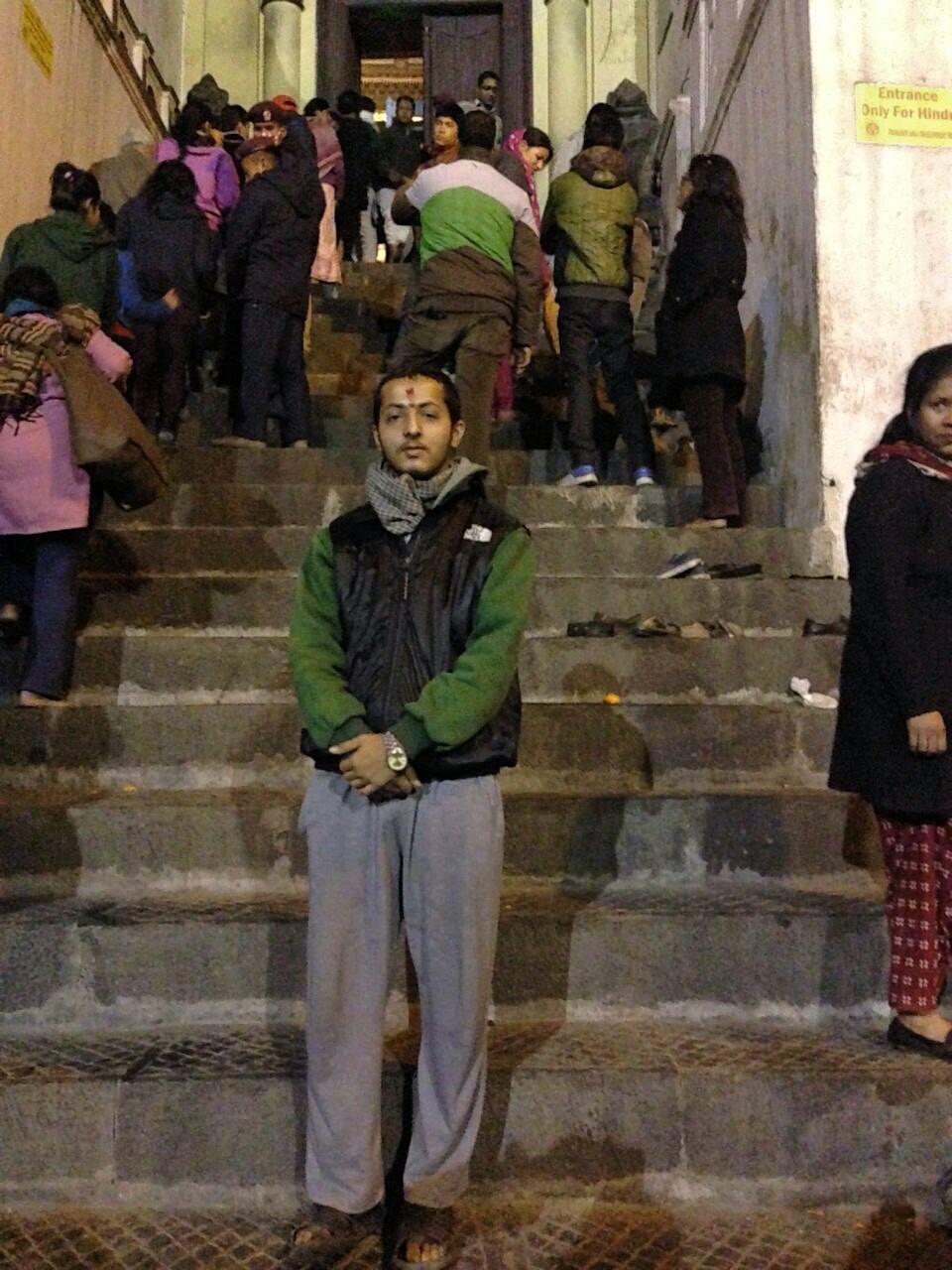
"Today is Shivaratri."
"What happened on this day?"
"Lord Shiva was incarnated today. Shivaratri means the night of Shiva. Hindus celebrate this day because Shiva is our creator and destroyer. We have 330 million gods, and Shiva is the god of all the gods."
"What is the significance of all the fires?"
"It is customary to light fires. The fires burn the whole night. The fires bring enlightenment. The fire burns all the negativity in our minds and hearts and sets our souls free."
"What else can you tell me about Hinduism?"
"The Veda holy books predict all things. Within them are descriptions of all the latest scientific discoveries, including the speed of light, galaxies, and the aerodynamics of airplanes and the underlying principles of how they operate."
"If you could sum up Hinduism while standing on one leg, what would it be?"
"All people are born equal and should be treated fairly."

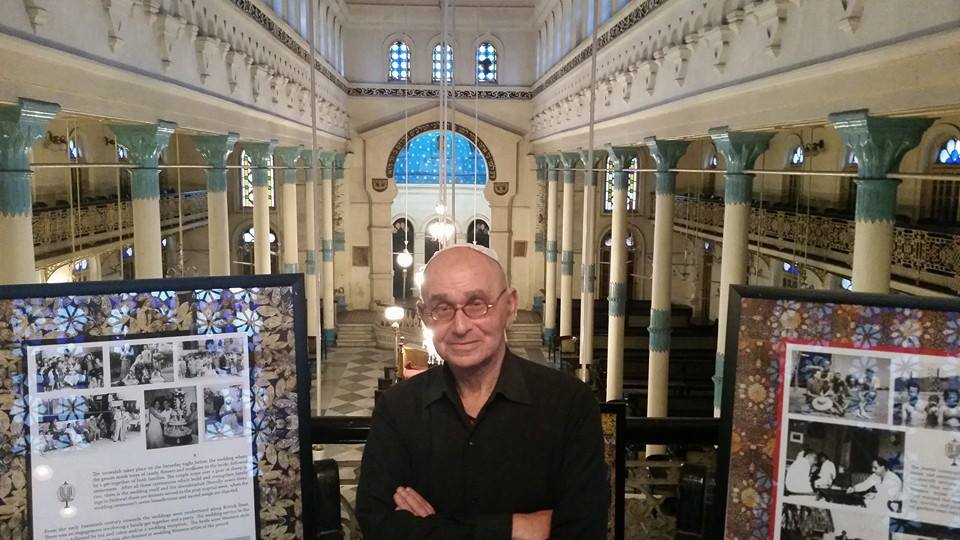
"I was born and raised in Kolkata to a family of Arab-Iraqi ancestry. We spoke Arabic and Hindi at home. I'm one of the last members of the Baghdadi community... Our community was once thriving, but now we are twenty-two."
"How does that feel?"
"All my classmates from Yeshiva are gone--scattered around the world. When I think about the decline of Jewish life and observance, I become sad. A synagogue should be a living building-not a monument to the past." — with Barry Mizrahi, Jared Lander, and Josephine M. Nomenclature.

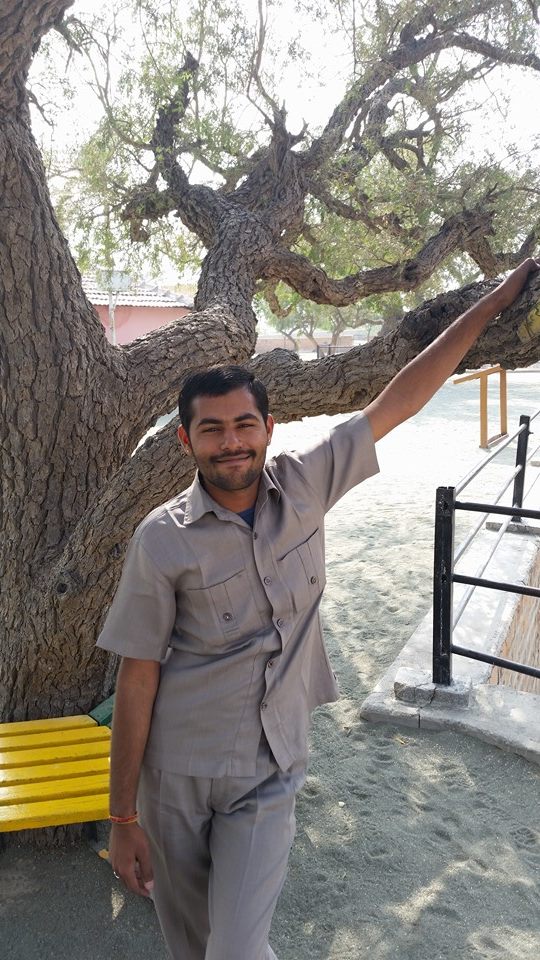
"A man should marry a poor girl from the village and a woman, a rich man from the city." — with Shambhu Prajapat Ecofriendly Stay.

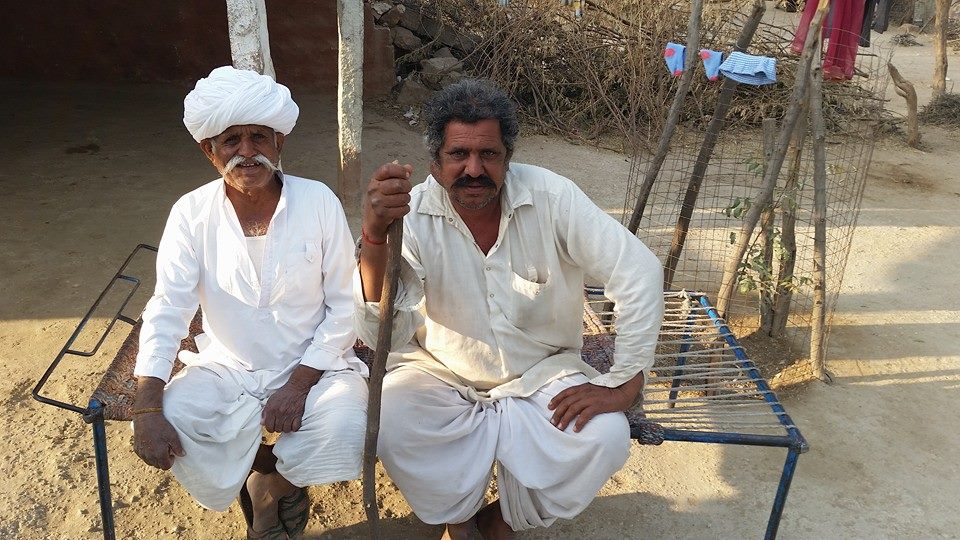
"Sverge and I have been friends our whole lives. When I was a boy, I would pick fights with everyone, sometimes two or three boys at a time. My father told me not to fight, but I did, anyway."
"Were you a good fighter?"
"Yes, I would throw one punch at their face and they would fall down. No matter what happened, Sverge always supported me. "
"Do you still fight?"
"No, these days I tell jokes, and Sverge laughs. "
"Do you ever fight each other? "
"No, we have always protected each other and we always will."

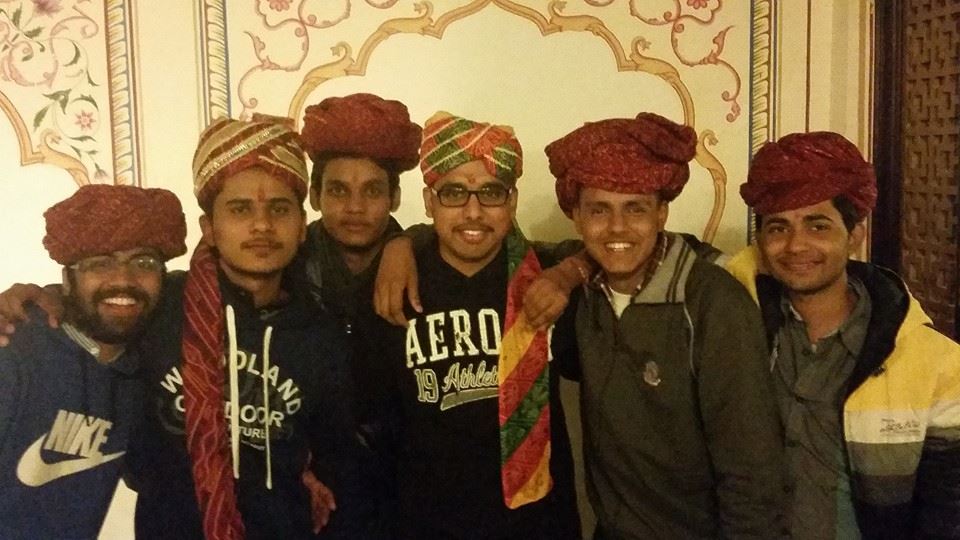
"We're traveling India together."
"For how long will y'all travel?"
"For one year."
"How did you come up with the idea to travel to India?"
"We are students in the university, and two of us were talking one day about how education isn't just about sitting in a classroom and preparing for a test, but also about being exposed to the world, learning about people, and our homeland."
"How is it that your group started with two, but y'all are now six people?"
"As the two of us were talking about our traveling goals, the rest heard about our vision and randomly asked to join."
"What have you learned from traveling?"
"In this world, there are lots of people, lots of emotions, lots of knowledge, and lots of religions. There is no limit to the beauty and diversity of life."
"What have you learned about each other that you did not know before?"
"We started as strangers, but destiny brought us together. We are now one big family. We support each other in everything, and this friendship makes us happy. We now want to tell the world that money can never buy happiness, but if you make others happy, then it is a life worth living."
— with Amogh Mishra, Anuj Singh, Tanmay Singh, and Sheba Rasson in Jaipur, Rajasthan.
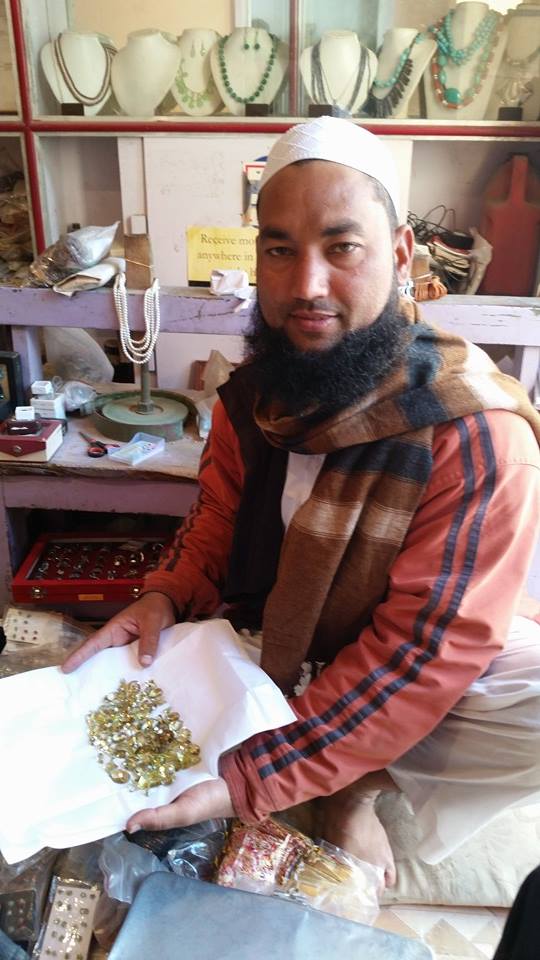

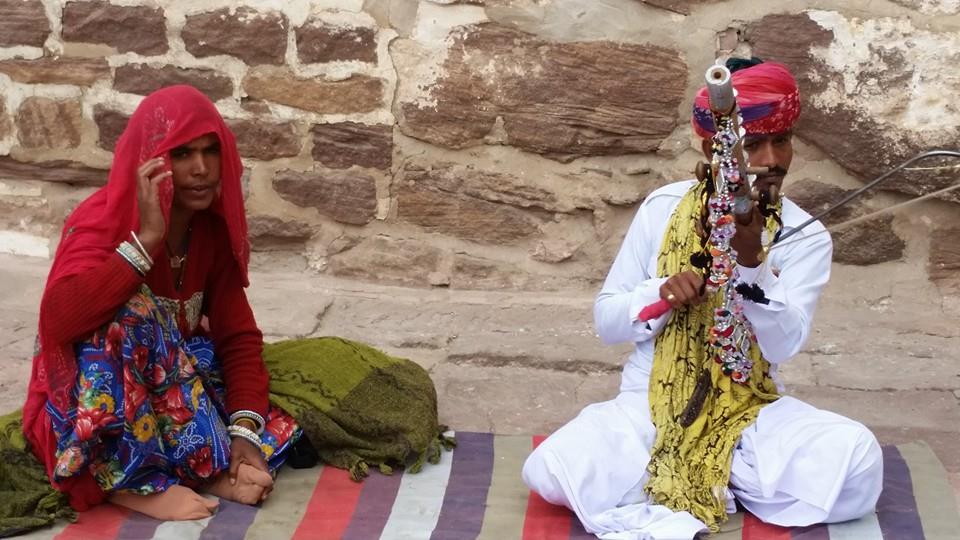

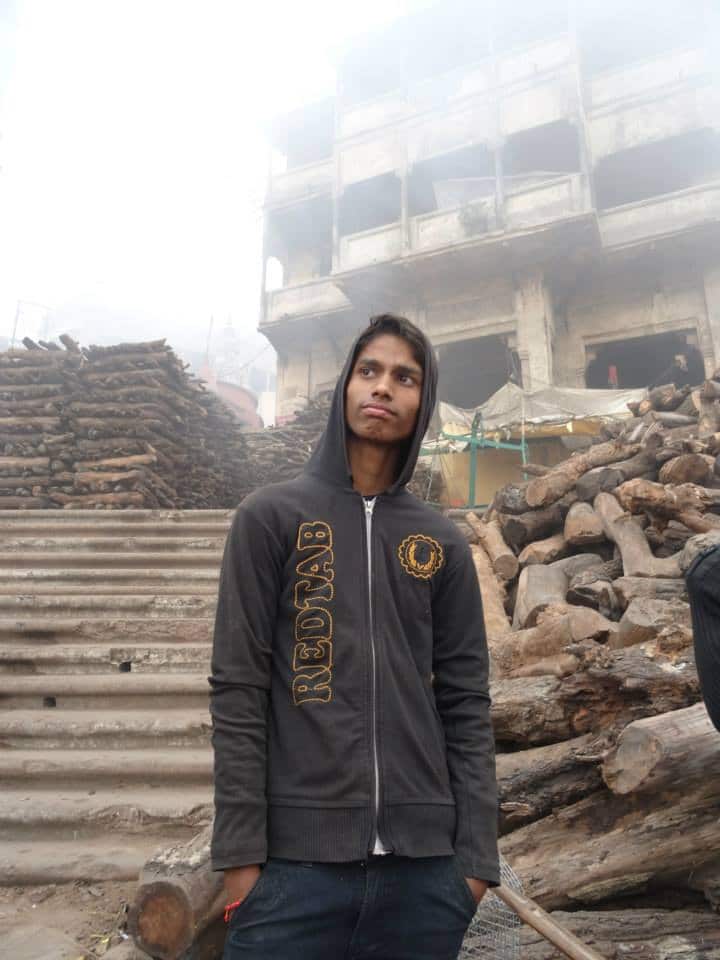
"Where are you from?"
"New York."
"What do you do in New York?"
"Uh... I'm a teacher."
"I never got the chance to go to school, and I can't read or write. Please, I beg you, sir, teach me something."
"How old are you?"
"I'm 19 years old. Please, sir, teach me something!"
"Who is wise? He, who learns from everyone. Who is rich? He, who is happy with his portion... Now you teach me something."
"He who is rich lives by himself, and he who is poor lives with everyone. If you say you have many things, then you have nothing. And if you say, "I have nothing," then you really have many things. Money is like water. It comes and goes. But if you find friendship, then even if the money goes, you still have friendship."
"What a great teaching!.... Tell me, what God do you believe in?"
"I was born into a family that worships Shivah, Dhurga, and Hanuman. But I know in my heart there is only one God--there is one God, but people call him by many names."
And as I left him, he reminded me, "Don't listen to astrologers. Astrology is fake. Your future is from your own heart... If you come again to the Burning Ghats of Varanasi, you can find me, just ask for Roey."
— in Varanasi, India.

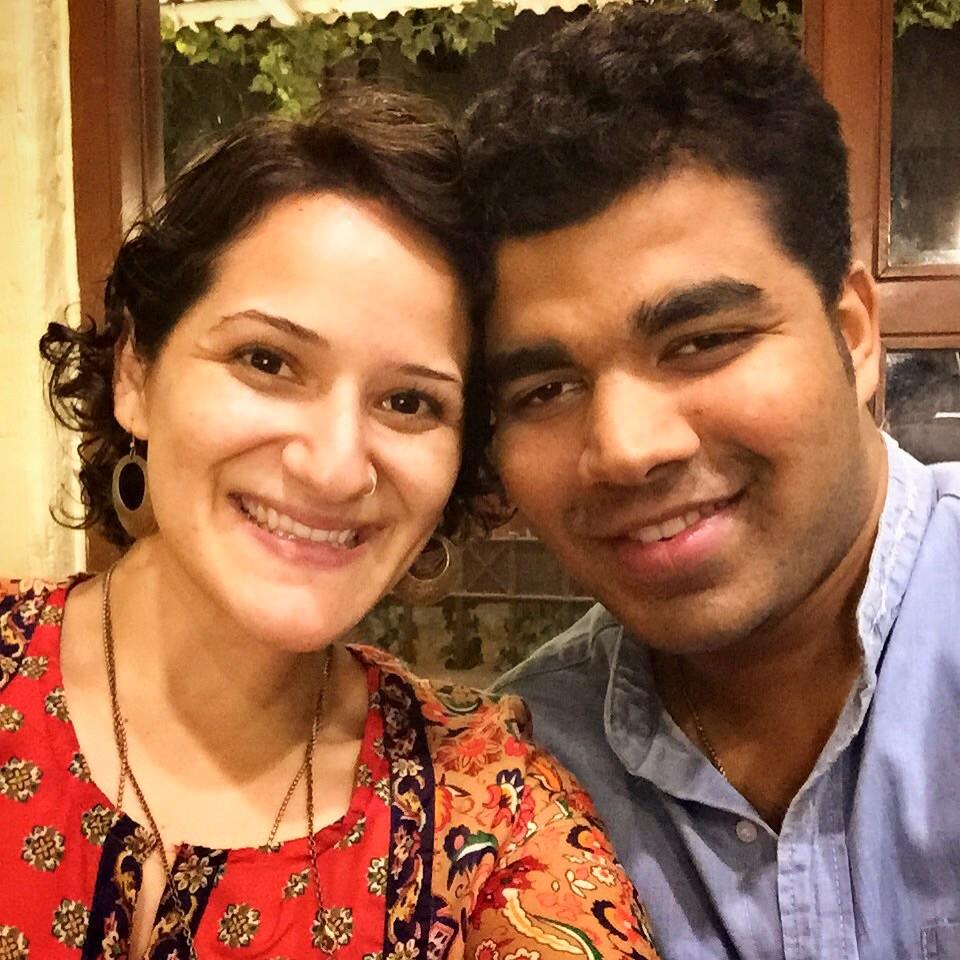
"We are two worlds brought together by love and public service."
"How did your worlds come together?"
"I'm originally from California... For a long time, I felt compelled to give to others, to contribute, to make others happy... After university, I left everything behind and came to India as a JDC Entwine Fellow...Five hours after I arrived in India, I was at a Shabbat dinner organized for the previous Fellow in what was to be my new apartment... As I entered my future apartment for the first time, I turned a corner into the living room and I saw Shay standing there, and he turned to look at me [and]... even though I was jet-lagged...something clicked, and we had an instant connection...."
"What has Shay taught you about love and service?"
“I'm the second JDC Entwine Fellow to fall in love with a local Indian Jewish guy…. [I’ve learned that] love comes from the deepest and most authentic of places within us all… it’s incredibly strong and has the power to move worlds within us... It’s the same thing with service too… Whatever your cause may be -- be it to help an individual or design a program to serve many – if it’s done with love, it can move worlds around us... When your love of someone is paired with service of others, the love reaches heights that you didn’t even know were possible....”
"....Couples that serve together, stay together."
— with Kimberly Ariella.

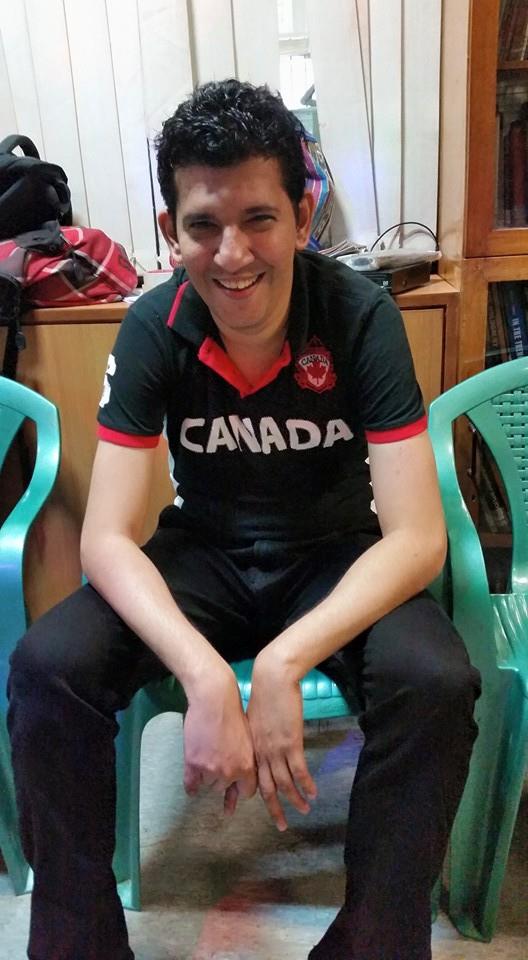
"What is it like to be an Indian Jew?"
"I feel safe in India. I am safe. I visited Turkey, and the Jews there are afraid to tell people they are Jewish. In India, I tell everyone and nobody cares. Actually, most people - seven out of ten people - have never heard of Jews. I try to explain to my neighbors what a Jew is, and they have blank looks on their faces. They don't understand. The closest thing I can come up with is to tell them is that Jews are a caste of international Brahmins that believe in one God... I know they kind of understand me when they ask me if a Jew is a kind of Muslim...."
"How are Indian Jews different than Western Jews?"
"We are the same... You Jews in the West, you say two Jews, three opinions. In Bombay, we are even more divided, we have eight synagogues and sixteen opinions... [For example], there are two synagogues here in Mumbai, Magen Hasidim and Tifferet. They are literally a stone-throw away from each other. They are always fighting. Nobody knows the history about why they are fighting... It makes no sense, and it just breaks my heart... I want people to be together. For the sake of God, I tell people - just be together.... "
"Why are you always cracking jokes and trying to make people happy?"
"Being in India, and Bombay in particular, the situation is very negative. There are so many people, and sometimes the people need to forget the things around them... Sometimes a person needs to forget where they are... The best part about India is that we will never have a shortage of serious people... I want to make them happy and make them smile... Smiling is a universal language. It means the same thing everywhere... I'm willing to take chances to make people smile....by telling jokes. A joke without a message is an insult...when people smile and laugh, they stand together..."
— with Effie Moses in Mumbai, India.

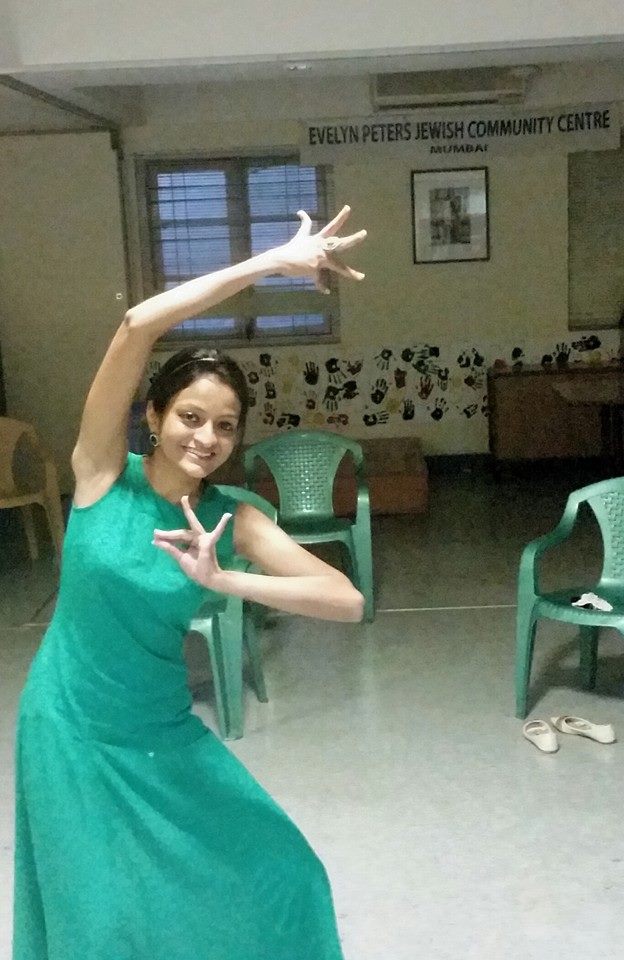
"Why did you move to Mumbai?"
"My community is literally dying; most of them, bedridden. My father was a shochet, but now he has stopped. There are no young men. There is no minyan. I'm the second youngest Jew in my community... There is no future for me in Cochin."
"What do you like most about the Jewish community of Mumbai?"
"When I first came to Mumbai, I saw so many other youngsters celebrating Judaism. I go to synagogue, and there are hundreds of people. I love love to dance, and I go to the JCC, and I dance with Salome Abraham and my other friends. I could have never imagined anything like that in Cochin. I feel happy that the Mumbai community is so active, but I'm sad that we will never have this vibrancy in Cochin...."
"What do you miss most about my brother, Isaiah Rothstein?"
"....His singing. He gave us Chai Torah talks, which are like Ted Talks. He was always singing and making people happy. We had so much fun with him...."
"What do you plan for the future?"
"I'm of two minds about my future - whether to go on aliyah or stay in India. In Israel, my sister passed Technion and still doesn't have a job. They discriminate against her because they think she came from a third world country. They say to her, 'there are Jews in India? You must have converted.' But we are not converts...."
"So why do you still consider aliyah?"
"In India, they want you to work on Shabbat, and I love Shabbat because you are away from technology -- spending time with your family and quality time with yourself. My father tells me that if I go on aliyah and join my relatives, it will be good for my future and my children. But I'm afraid to go on aliyah alone... But I survived Mumbai -- and as they say -- if you can survive Mumbai - you can survive anywhere...."
— with Leya Elias at Maharashtra.

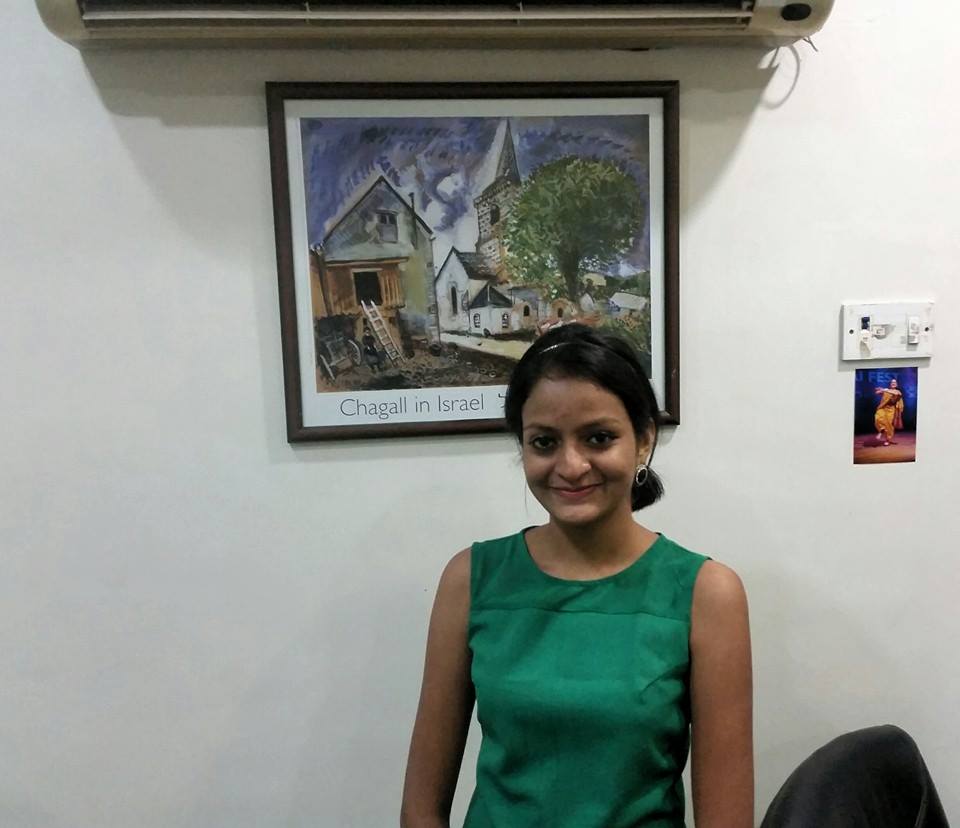
"My ancestors came to India during the destruction of the first temple. The Babylonians took them captive and put them on a ship. But we fought back. We took control of the ship and headed to Cochin. Cochin was an old trading port of King Soloman, and the local Maharajah knew about the Jews. We had nothing, but the Maharajah gave us clothing, food, and land... We were the first of the four Indian Jewish communities to arrive..."
"What was the relationship between the Cochini Jews and other Indian Jewish communities?"
"... All the great Hakumamim of India were Cochini. We knew Torah and Talmud and taught the other communities how to study Hebrew... Then many hundreds of years ago, the Pardesi Jews came to Cochin from Europe. When the Pardesi's came, they discriminated against us because of our skin [color]. They called us black Jews and we called them white Jews, and they refused to marry us. The white Jews took control of the community and stole the tablet the Raj gave us, saying that we were welcome in Cochin for as long as the sun and the moonlit the sky."
"How did the Pardesi discriminate against the black Jews?"
"In the past, the Pardesi's refused to let us enter their synagogue. They never invited us for Shabbat or holidays. Later, when their numbers dwindled, and they needed a minyan, they made us sit in the back of the synagogue during prayers. Today, when the journalists come to Cochin, the Pardesi's will tell them there are only seven Jews [the Pardesi's] left when really there are 29 [Pardesi's and Malarbari] Jews left...It makes me so mad... I'm a black Jew, and I'm proud of it...."
"What have your experiences taught you about Jewish unity?"
"We are all human beings, and we are all Jews. It doesn't matter if you are a white Jew or a black Jew, a Pardesi or a Malarbari, a Baghdadi or a Cochini; we are all descended from Abraham, Isaac, and Jacob. We have the same mitswath and the same laws. We might look different, we might have different customs and traditions, but we are brothers and sisters. All Jews are responsible for one another."
— with Leya Elias at Maharashtra.

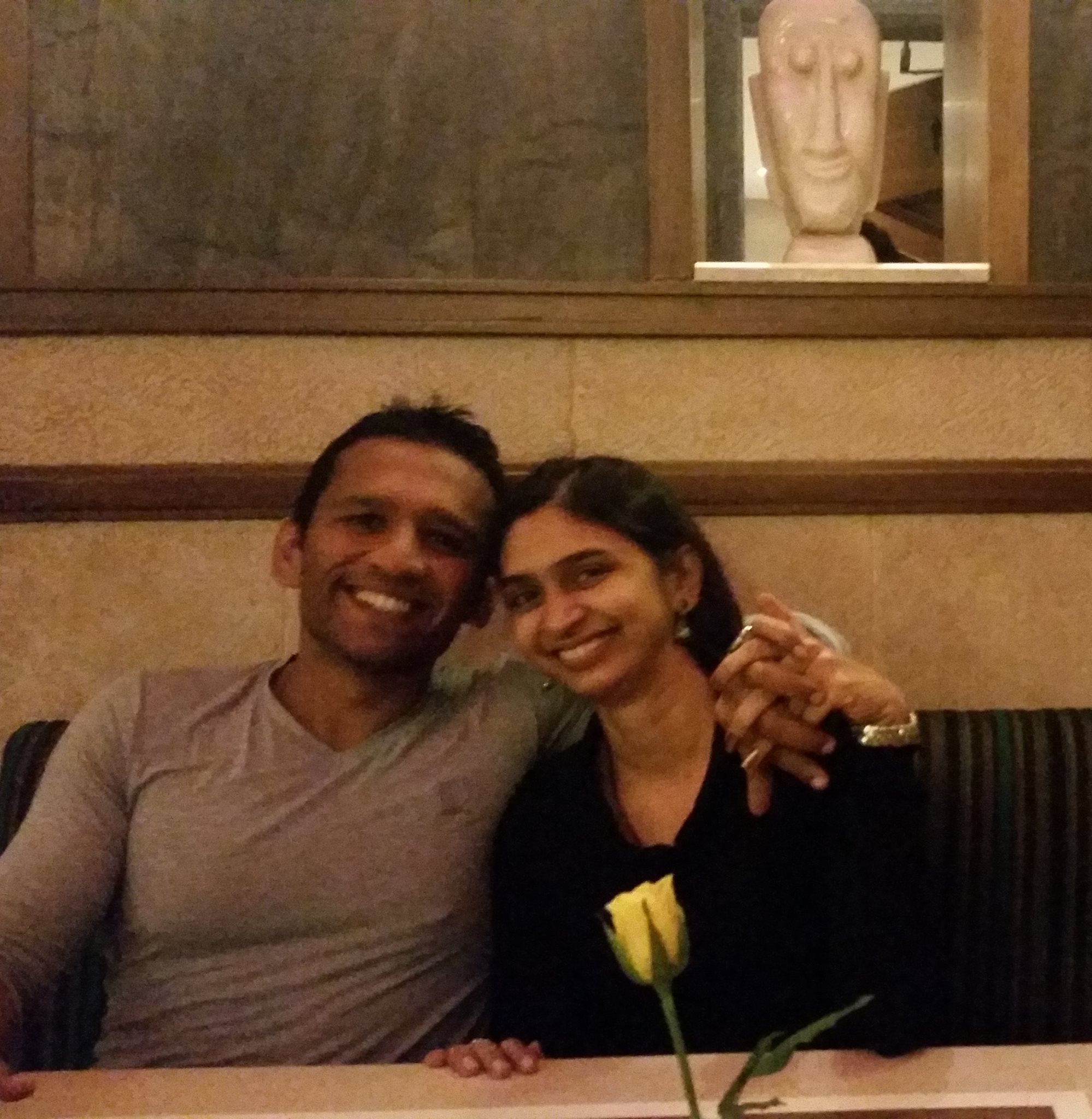
"We met in a library."
"It wasn't an arranged marriage?"
"No. It was a love marriage. I had noticed him staring at me daily from across the room. One day, he came over to me and told me that he didn't have any friends, that his girlfriend had just broken up with him, that he was all alone - none of which was true - and he asked me whether I would be his friend. "
"Fifteen days later, I gave her a love letter...."
"...which was written by someone else..."
"...and within a month, we got engaged."
"My family is Utter Pradesh Brahman, and his family is Marashtrian Shatriah. My parents were completely against the marriage. They told me that I was out of my mind and that the marriage would never work because we are from two different castes. I told my parents that I was going to marry him, or I would never marry."
"Her parents prevented us from getting married for six months. My parents tried to talk to her parents, but nothing helped."
"I fasted for fifteen days, without food and water, in protest of my parents' decision. I was bedridden and, eventually, my parents allowed us to marry."
"We got married on my birthday, and we have been happily married for five years. We are very in love, and our love grows every day. She and I have great fights, but they are never about our different castes."
— with Prachi Shinde in Mumbai, India.

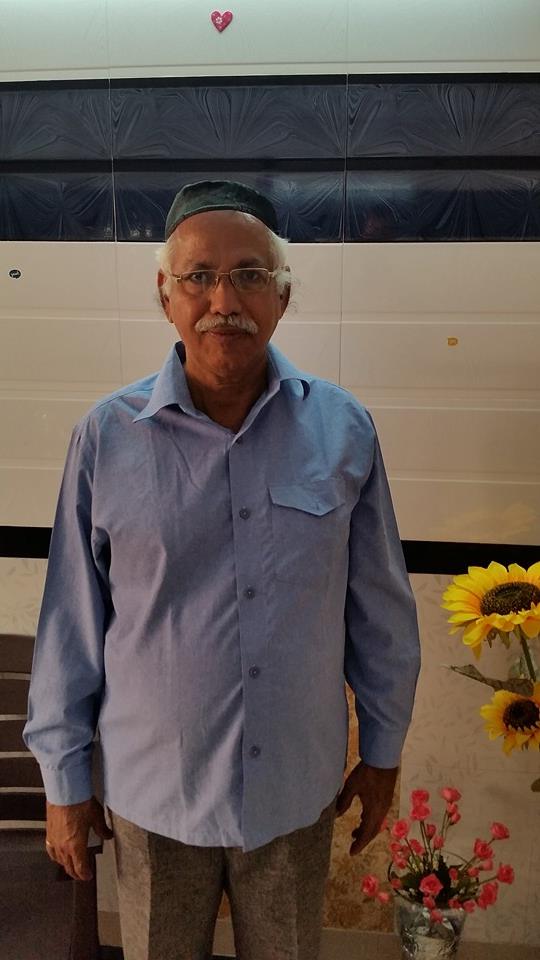
“I got married when I was thirty-one years old. It was an arranged marriage. I was looking for a wife, and my elder brother arranged my marriage through a relative of my wife, Eliza. Eliza’s family did research on my family background and asked about my profession. They told me that Eliza was a good girl, that she was very smart, that she wasn't interested in fashion like the other girls---and that she wasn't so keen on getting married at the time because she wanted to start her own business. They told me that she had a strong sense of justice and that, having managed her father’s business, she would know how to manage a home. Somehow, even without meeting her, I found all this attractive.
We met for the first time at her brother’s house. The whole family was there: my family, her family. Her brother and my brother led the conversation; it was all very awkward. But we liked what we saw, and although we didn't say much to each other, we decided to get engaged. The second time we met was at our engagement party at the Magen Hasidim banquet hall. After the engagement party, we went with some relatives to buy a sari for the wedding and jewelry.”
“How did you know that you would like her?”
“I didn't. It was like a flip of a coin, and I got very lucky. We have been married for over thirty-two years, and we are very happy. My advice for marriage? During the proposal period, every family tries to look its best. But when you get married, when you live with someone, you realize that nobody is perfect, and the building of marriage takes love and commitment to be successful.”
Shalom Abraham Phansapurkar, age 63.
— with Gitta Abraham and Abraham Shalom.

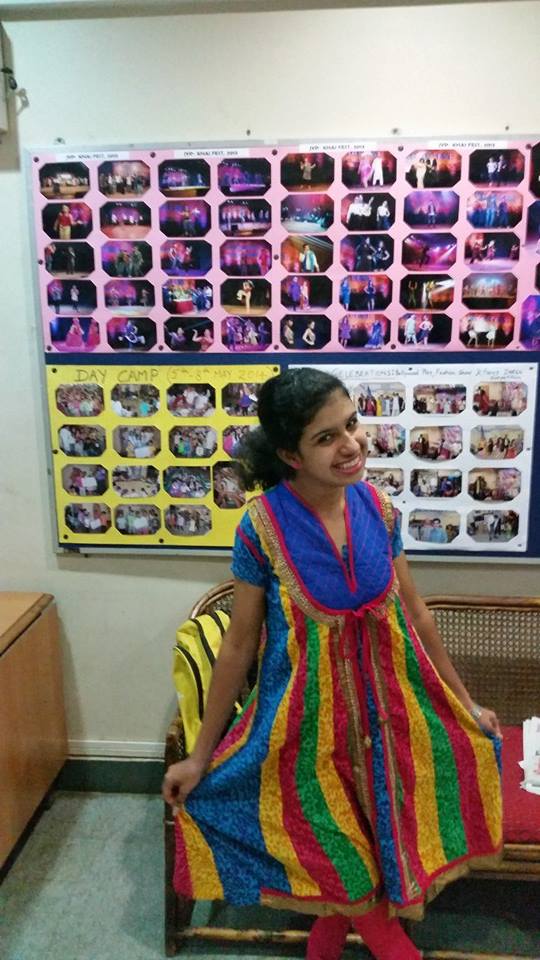
“I’m twenty years old, and I’ve been teaching Sunday school at Gan Katan since I was sixteen.”
“How did you become a Sunday school teacher?”
“I was on school break, and I was very, very, very, bored. I was looking for something to do and went to the JCC. There were Sunday school classes being taught and, not having anything else to do, I began to volunteer. I was very good at teaching and the senior teacher, Jeanine Buzali, a volunteer from the USA, saw that I had the potential to be a great teacher. After some time, the JCC offered me an official position even though I didn’t know much about Judaism and could hardly read Hebrew.”
“How did you learn to read Hebrew?”
“A Jewish Service Corps volunteer from the USA named Erin Beser changed my life. I was thirteen years old, and I couldn't attend Hebrew classes at the designated time. My mother told Erin how badly I wanted to learn to read and write Hebrew. And so every day, Erin came to the Jacob Sassoon High School, on her own time, to teach me.
Erin taught me to read and write Hebrew. She taught me songs like ''Yibeneh Hamigdash" and “Shabbat Shalom.” We became very close. She was a passionate, compassionate, hard-working, and supportive person. Erin was the kind of person that was concerned about each member of the community and each of her students. I miss Erin very much, and I think about her often. I see her as an ideal teacher who goes out of her way to teach her students.
These days, I teach kids aged 4 to 12 years old every Sunday. By teaching others, my love and knowledge of Judaism have increased, and today, I read Hebrew well. I teach the kids how to read and write Hebrew, about Jewish festivals, the mitzvoth, and Jewish songs. I try to live up to the teachings that Erin, and the other JDC volunteers after her, embodied. I love teaching because I get to learn about different kinds of people. And it feels good to know that the kids get Jewish knowledge that I didn't get as a child.”
“What is your hope for the future?”
“Once, one of my students, a five-year-old, proposed to me. I didn’t want to break his heart, and so l told him that I would marry him when he got older. He was so happy that he started dancing around me and singing in Marathi, “maji navhri” which means “my bride, my bride.” I want my students to find Jewish soul mates and pass on the knowledge that they have learned. I would really appreciate it if other Indian Jewish youth my age would also teach Judaism. We need more teachers in our community. It is the need of the hour.”
“What words of encouragement would you give to Hebrew School teachers all over the world?”
“Wow. I don’t know. Well, I would only say that the survival of Judaism is totally dependent upon the teacher. We play an important role in transferring knowledge to the next generation. We must encourage young people to become teachers and must accept all students without any prejudices, and must do our job with all sincerity.”
Eliana Sassoon Phansapurkar, age 20.
— with Eliana Phansapurkar at Maharashtra.

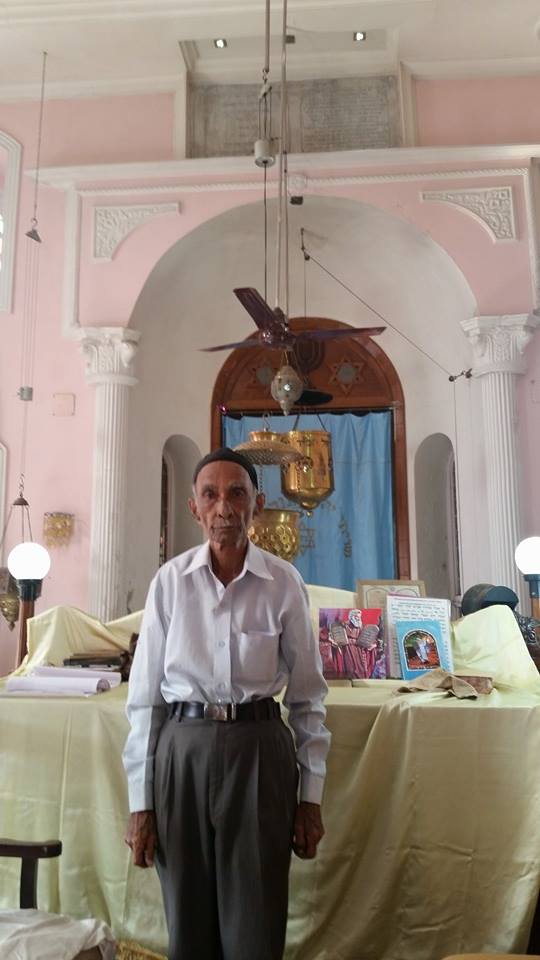
"I am Jacob Elijah Dandekar. I am known as Baba. I'm 84 years old, and I am one of the last Beni Israel of Alibagh.
I've been a Hazan for over 45 years. I learned to be a Hazan from Baruch Gadkar, who was the secretary to Jawaharlal Nehru, the first Prime Minister of India.
When I was a Hazan, I always gave the children a portion to read so that they would love to pray. My father taught me the importance of prayer, and today, I still know the Tehillim by heart. My father would wake me up at 4 am to go to morning prayers. He would call my name, "Jacob, Jacob, Jacob," and if I didn't wake up, he would shove me. In those days, we went to pray or we were beaten. Prayer was very important. In fact, when I was a boy, I remember a man from the village of Korli who would walk 3km every day just to attend prayer in the Borli Synagogue.
I remember that on Shabbat, all the people would come together in unity. It made me feel so good inside. Every family sat in their home with their Shigli, which we used the keep the food hot on Shabbat. On Hashanah Rabbah, we would stay up all night and study and pray until the morning, and then together, we would attend the morning prayers. Some of us kept cows by our homes, and only a Beni Israel would milk them.
There were five children in my family. We were four brothers and one sister. All are gone except for me. My sister Tziporah was very loving, and whenever we visited with one another, she would always make me feel loved. She would have a meal ready for me and always wanted to spend time with me. She moved to Israel and died.
I am the guardian of this Knesset. Today, nobody comes to pray anymore. Nobody knows Hebrew or even how to pray. My hope for the future is that Jewish children will study Hebrew and prayers. In the house, the parents should show a love of prayer and of learning the Torah. The parents should go to synagogue to set a good example for the children. Here, there is never a minyan. Every day, and every Shabbat, I come to the synagogue, open its gates, and pray alone. I am alone, but I have God."
-----
I was inspired by Humans of New York, Humans Of India, Humans of Judaism
— with Yael Jhirad, Ralphy Jhirad, and Anna Schultz in Alibágh, Maharashtra, India.

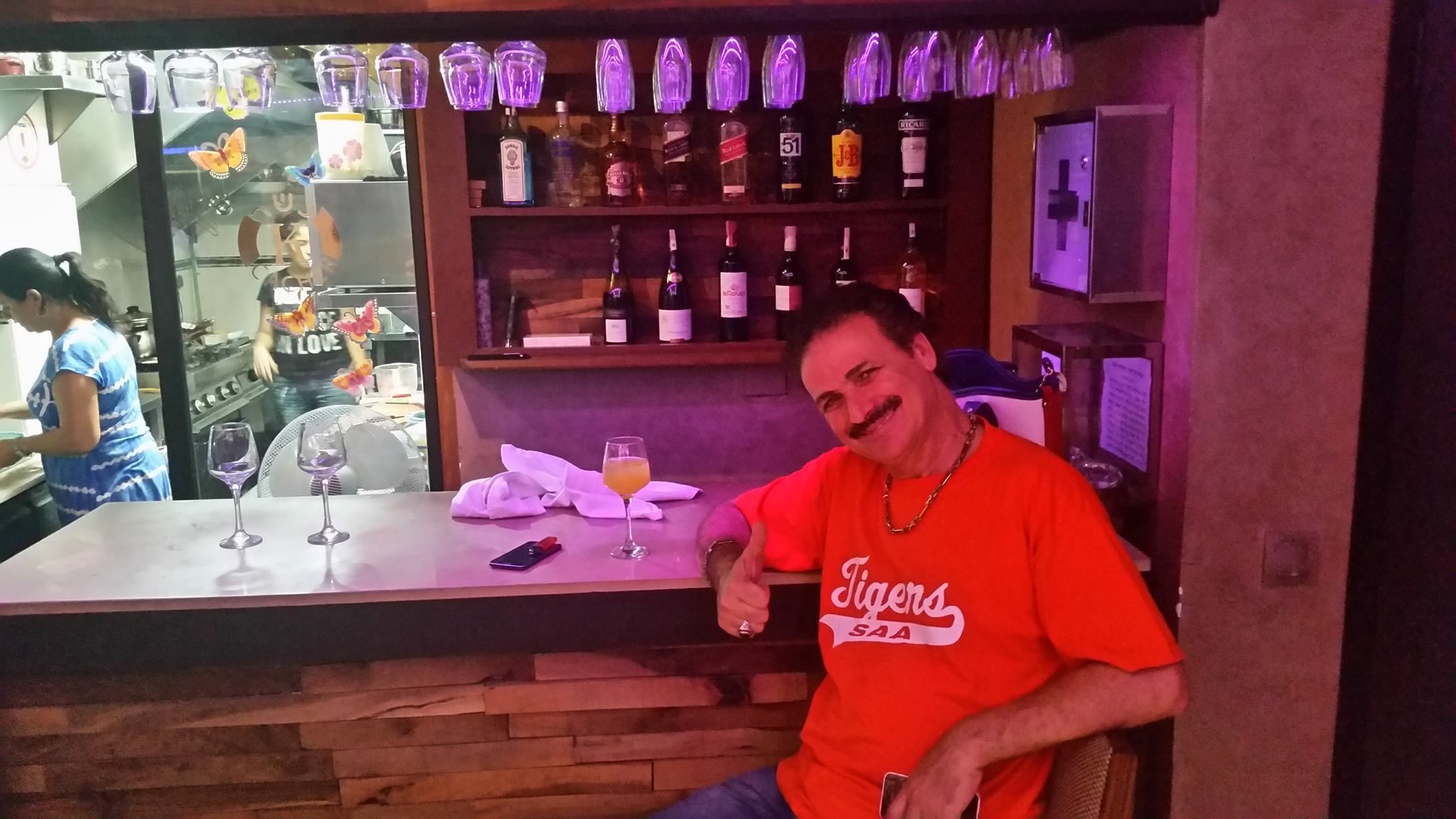
“I live in the Mellah, surrounded by more Arabs and Muslims than any other Jew in the world, but I feel more at home, more safe, here, than anywhere else I have lived…”
“... there are other countries where you could live…would you move to one of those countries?
“I’m 100% Moroccan. My ancestors have lived in Morocco for 2500 years… and [also from] the expulsion from Spain in 1492. No matter what anyone says, this is Jewish land and my land... Let me explain to you, I won’t go to Israel, I won’t go to America or France. I have everything I need here... I own the only kosher [restaurant Dar Ima] in Marrakech. We have a great synagogue, with a minyan [prayer service] every day…. In some cities, there are many Jews, and they are not interested in a minyan. Not here... In New York, when I lived among the Satmar Hasidim, I saw they had a synagogue where they had minyanim straight from six in the morning until midnight... But I never felt welcome among them...They never accepted me... Here, everyone is welcome, I have kosher food, I have Shabbat, I always have a minyan, and I live in a country that... [although not perfect] accepts me…. I have always felt welcome in Marrakech... It's an amazing city. It’s the city of my birth."
— with Chouvi Assayag and Pinhas Assayag at DAR IMA Restaurant Cacher Marrakech.

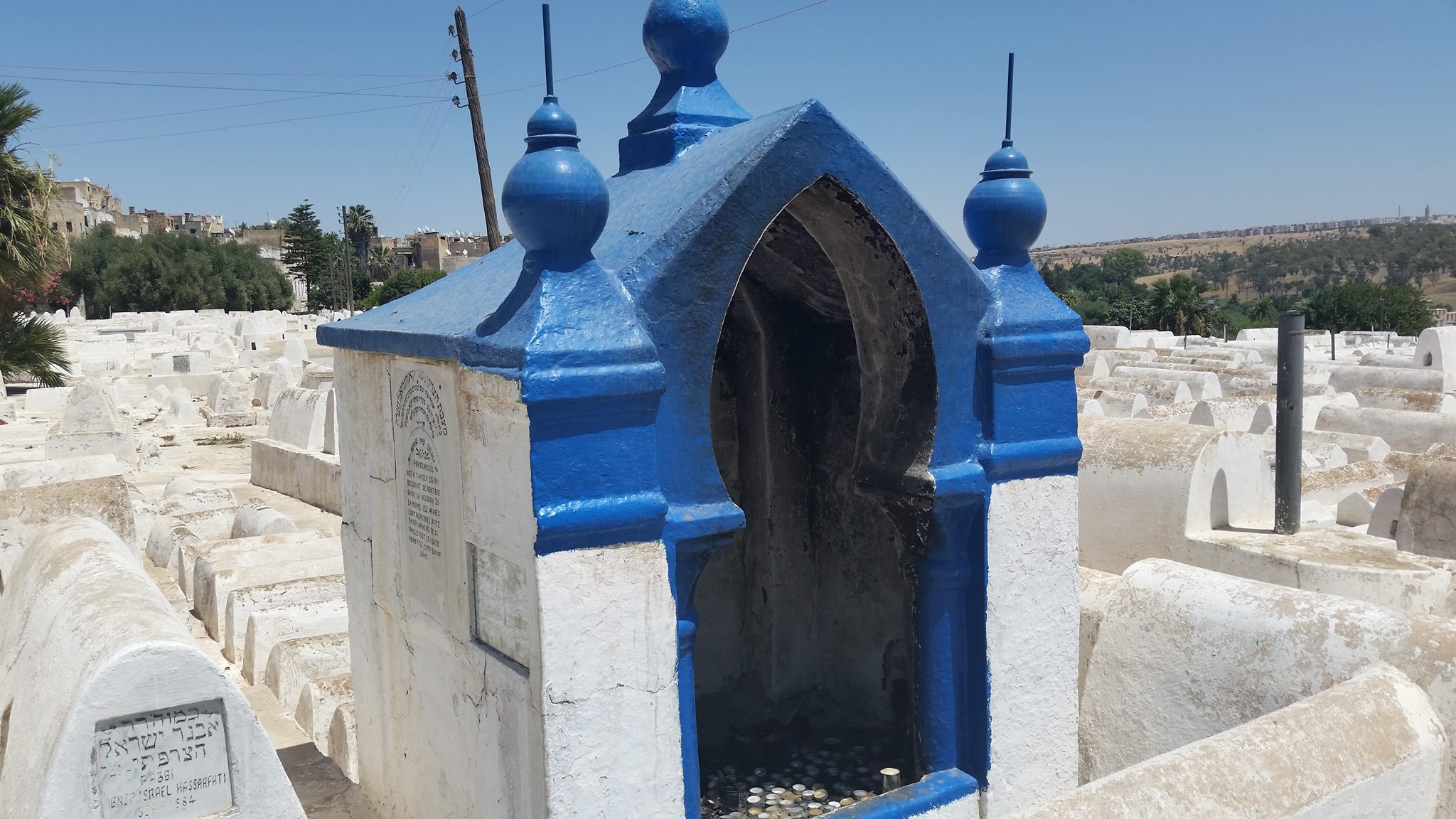
This is the gravestone of the righteous Soliqa Haguel, a virgin maiden who greatly sanctified the Name of Heaven (על קידוש השם) and died a martyr in the glorious city of Fez in the year 5594 (1834) [and is] buried here. May the Lord protect her. May her merit protect us. May it be God’s will.
https://en.wikipedia.org/


"How did you become such a well-known sculpturist?"
"There is no creativity without risk."
"What does that mean?"
"Every aspect of creativity involves and requires risk. Risk is a condition of the creative process… This means… being able to accept and embrace uncertainty. The ability to contradict my own forms is at the basis of every break-through I have made as an artist. I feel I must always challenge my own aesthetic to go beyond the boundaries of what I have already created. There is no growth without change…or risk." — with Remy Blumenfeld, Jared Blumenfeld, and Helaine Blumenfeld in Cambridge, Cambridgeshire.


“What is your life purpose, and what have you done to accomplish it?”
“My life mission is to preserve Jewish culture in Morocco and to be a servant to society…The first step to accomplish my life mission was to find other people who think like me---those who have the same or complementary missions as me. I searched for these people because I know that no person can accomplish his mission in life by himself. I, then, decided that the best engine for change is civil society, so I gathered these people together, and we started an NGO called Mimouna…"
“What is Mimouna?”
“Mimouna is an organization founded by Moroccan Muslims to preserve Jewish history and culture in Morocco. Members of Mimouna are very proud and devout Muslims by religion, and we are ethnically Amazigh and Arab. As Moroccans, we know that the Jewish history in this land runs very deep...By preserving the Jewish culture in our homeland, we are preserving our own Moroccan culture and heritage... “
— with Elmehdi Boudra in Rabat, Morocco.


“Why have you dedicated your life to public service?”
“When God created humans, he created each one of us with a purpose - to be an agent of positive change in this world. There is a difference between humans and other species on this planet. Unlike animals, we are in this world to more than just eat, sleep, drink, or procreate. Each human has the mandate to do something to improve the lives of other humans and to leave a unique legacy. Every day, I wake up, I look in the mirror, and tell myself, ‘God created me to be an agent of positive change. Am I living up to my potential and life purpose?’” — with Elmehdi Boudra in Rabat, Morocco.


“How does a Moroccan Muslim come to speak Hebrew?”
“I grew up in the Mellah, and as a child, large groups of Jews would visit the synagogue. I was curious about them, and I would say Shalom to them with a big smile... One day, I met an old blind Jewish man named David Perez, who lived near me. He was a very religious man and needed to pray daily... Every day I would lead him from his home to the synagogue. I would sit with him in the synagogue, and I would sit with the other old men, and they would teach me Hebrew and about life.”
“What is the most meaningful thing they taught you?
“They taught me much Torah…. It says in Pirki Avot "איזהו עשיר? השמח בחלקו" (“Who is rich? He who happy with his portion.”) The word 'Ashir' (rich) is spelled Ayin Shin Yud Resh. The letter 'Ayin' stands for 'Aynayim' (eyes) and the letter 'Shin' stands for 'Shenayim' (teeth), and the letter 'Yud' stands for 'Yadayim' (hands), and the letter 'Resh' stands for 'Reglayim' (legs). This comes to teach us [that] if you have a healthy body, and you see the world the right way, then you are truly rich; you should be thankful for what you have, and you should be happy.”
— with Youssef Safine in Marrakesh, Morocco.


"I'm almost 90, and I've worked [at the Beit Ha-Chayim cemetery in Fez, Morroco] for over 45 years... I remember, when someone died, the families would come and stay with the bodies all night until they were buried so that the body would not remain alone..."
"What do you remember about the living?"
"I remember the Jews were vibrant people. They had many celebrations and they would invite us to celebrate with them. They would give the Muslim poor a charity along with the Jewish poor. They made no distinction between us...[now as an old man] I often recall how when the Jewish kids were playing, and they saw an old man like me, they all stopped to walk the old man home... When the Jews were here, we all got along very well..."
"What has working at a cemetery taught you about life?"
"At the end of the day, you don't own what you give to people, and you don't own what you receive. Whatever your share is in this life is due to Allah. We do not belong to ourselves. Allah created the Jew, Christian, and Muslims... We are all vessels of Allah, and we cannot disturb each other without disturbing the rights of Allah... We want no trouble with the Jews... Allah only wants that all his children can live together in peace."
— with Sarah Aguisoul,Igor Kovacic, Daniel Vincent Jensen, Reda Ayadi and Sebastian Dahllew Phliipsen.


"My family has been in the tanning business for generations. See around us? There were once dozens of these tanning pits around Fez, but now there are only three."
"What lessons have you learned from the tanneries that you are afraid might be lost if the rest disappear?"
"We have a saying here, 'harfat el yedaiyn akhsan, min mal al-jadayne,' the work and skills you acquire with your hands are better than the money that you get from your grandparents or ancestors."
"What does that mean?"
"Whoever has a life skill to use is better than one who just has wealth. When the money disappears, when one just spends his time eating at home and getting fat and does nothing else, one, in the end, has nothing. For me, because I have a set of skills, you can give me an egg today, and tomorrow I'll give you a chicken."
— with Daniel Vincent Jensen, Sebastian Dahllew Phliipsen, Sarah Aguisoul, Igor Kovacic and Reda Ayadi in Fez, Morocco.


"What have you learned from being a curator at the Cairo Geniza?"
"Mankind hasn't changed that much in the last thousand years. In the Geniza, we find that people have the same complaints, the same passions, the same dreams, and the same hopes; and there exist the same tensions that we have today between political leaders and the people. One of my favorite discoveries is of a Yiddish letter written by an Eastern European woman living in Jerusalem, whose son was studying in Cairo, who writes to her son saying, 'how come you don't write me? How come you don't come to Jerusalem to visit me? You must not love me.' The love and pain of the letter still resonate a thousand years later." — with Gabriele Ferrario, Rav Shmuly Yanklowitz, Manouchehr Shamsrizi, Danny Richmond, and Elke Reva Sudin at Cambridge University Library.


"What is it feel like to be looking at the great Cairo Geniza?"
"Before I came to the genizah, the Rambam was just a legal mind, an abstraction, an idea of history as opposed to a concrete person. His ideas were perfected, as opposed to those that needed revision. Seeing Rambam's draft of the Moreh Nevuchim [Guide for the Perplexed] in his own handwriting, one of the greatest works of philosophy in history with his doodles and him crossing out his mistakes, reading about the death of his brother and seeing his teardrops on the letter, and that he took the time to intercede on behalf of a poor woman makes him come alive for me.”
"What do you learn from this?"
"It reminds me that he was human, and despite his obstacles, despite any mistake he made, he moved forward to accomplish his goals, and it reminds me that we must do the same."
— with Rabbi-Shmuly Yanklowitz, Rabbi Dr. Shmuly Yanklowitz, Rav Shmuly Yanklowitz, Uri L'Tzedek, The Shamayim V'Aretz Institute, Interfaith Animal Welfare, Tav HaYosher: The Kosher Ethical Seal, Jews for Animals, Valley Beit Midrash and Jewish Ethics & Social Justice at Cambridge University Library.


"It was love at first sight."
"How long have you been together?"
"It's been two years and we have been crazy for each other ever since." — with Blanca Boné and Adam Bjourson in Newcastle, United Kingdom.


“My family is from Gabes in southern Tunisia…. When I was a boy, we moved to Tunis, and we lived in an apartment building with many other people….. I came from a religious family -- we are believers, the children of believers – and I would sing the songs of the Sabbath every week with my family…. I have been blessed with a beautiful voice, and my neighbors would say to my mother, ‘Ibrahim has a beautiful voice - why don’t you take him to the mosque to become an Imam?’...”
“…Did having a nice voice ever help you in life?”
“…It saved my life…and it helped bring peace to the Middle-East….”
“How?”
“…One day, when I was about thirteen or fourteen years old, my friends and I were returning home from praying mincha and arbit. To get home, we had to pass in front of a mosque. We did this often, and the men outside the mosque would normally just shout out to us, “Ashehad! Ashehad!” [convert] They would call us smelly Jews and Jewish dogs and tell us that they would kill us on Yom-al-Kaiyama [the day of judgment]. Sometimes they would beat us….and that was it....and we would [normally] go home without any real problems…. But on this day, we were walking home, and we were singing Arabic songs - good ones by Umm Kalthoom, Abdul Halam, Sabel Fahri - and a group of men approached us and asked us to play football with them. We didn’t know what to do. They were grown men, and we were boys. They had long beards and were very religious... We were afraid of them... We didn’t want to play with them... “
“Why did you refuse? What happened next?”
“....We believed whether we won or lost, it would go badly for us…. We stood in front of the mosque, and it was right before prayers and a huge mob formed around us…. There were [like] a hundred men, and we were a group of seven or eight boys...[One] started to push us around. It was bad… but then one of the men in the mob recognized me and knew that I could sing….[and] soon the crowd [instead] was demanding that I sing -- so I began to sing…. They stood there mesmerized by my voice…. They loved it…. They went from a mob of hate to a crowd of love. ….They started clapping and screaming in joy, ‘Allahu Akhbar, Allahu Akbar....'”
“Did you ever get harassed again?”
“No. The Imam heard my prayer, and he came outside of the mosque to see who was singing…. The Imam realized what had been going on and began yelling at the men to never bother us again – we were children – 13, 14, 15 years old…. From that day forward, the men never beat us…. And we developed a respect for one another...and some of us even played football together—even the Imam joined us….”
“How do you feel towards this mob? If you could share something with them, what would it be?”
“I love peace. Jews must love peace. Every day in our prayers, we pray for peace - for ourselves and for mankind….If I could tell those men something, I would tell them to do teshuvah [repent], to go, study the Quran, and to return to Allah [because] I think that they didn’t learn their Quran well. Just like in the Torah, it says that a person is obligated to love his neighbor like himself, so too [must it be] in the Quran.”
“What song did you sing?.... Why do you think the mood of the crowd changed so quickly?”
“The song that I sang was a prayer of peace, from tefillah, in a Jewish maqam [melody] of the Middle-East. To the Muslims, our song sounded like their songs. Our prayer sounded like their prayer. When I started singing, it reminded them that we were human beings and Tunisians too, that we weren’t so different than them…. And this is how it is between human beings - for once we see the humanity and similarity in the other - then it becomes hard to hate each other….”
Note: This interview was conducted in French, Arabic, and Hebrew and translated into English
— with Sarah Fellous in Paris, France.


".... Shouldn't you be in Yeshiva learning about [Passover]?...."
"....The Torah tells us to have friends - to befriend good people, to not hurt people...to make for yourself a friend... Bowling keeps us healthy; it relieves stress and is a good way to build our friendship... Also, we are on bein hazmanim [break] now... We learned... and now... we play...."
"....What advice would you give to other Yeshiva bachurim around the world?"
"....Work hard and play hard... During zaman [the semester], you should shteig [study hard]..., but during bein hazmanim [break], make sure to have a good time with your friends...but do not forget what you learned... It's all about balance." — in Montreal, Quebec.


"Why do you play music on the streets?"
"I studied philosophy at university, and in my studies, I came to the conclusion that music is not only very important to me, but also for society... Music is the expression of the vibrations of the world, of the soul and feelings of mankind... it makes people happy...."
"....Okay. But does music actually offer any tangible benefit to the world other than the happiness of some?"
"I once went to a friend's party. Most of us didn't know one another. People were drinking, and one man became very physically and verbally aggressive with a girl... They were screaming and cursing at each other... We couldn't stop him... I took out my saxophone and started playing, and within moments, they stopped fighting... Music can calibrate the soul. It can bring people together and remind them about what is important in life. Music creates peace and love between people... You see the people are passing, they are in Paris, and they are happy because there is music... Paris is the city of love only because of its music...."
"....What advice do you have to offer others?"
"....You have to listen to yourself -- about what is good for you - what is not good for you and to do what you love with your life. [This] is for me very important and I think it's important for everyone else too... Happiness is not a question of how much you earn every month. It isn't a question of money - we live in a world where you need money, and without it, you can't live -- this is a fact. But a lot of people are running after money [and in the process] they forget to live and to be happy - this is a very big problem in society. People get so caught up in the pursuit of money that they forget what it means to be human. We cannot forget the roots of what it means to be a human being."
— with Abel Grégoire at Tour Eiffel.


"I'm a hacker and member of Anonymous."
"What was the last website you hacked?"
"Last month, we DOSed ISIS websites...."
"What have you learned about life from being a hacker?"
"I consider myself a cyber warrior. My goal is to create a free and transparent world through hacking. I've learned that in life, nothing is ever as it seems and that it's important to question everything and find your own truth."


"How old are you?"
"I'm three, and Yoav is two..."
"What do you love most about your brother? "
"I love to take him to school and look after him. One day, Yoav will be 14, and I won't watch over him anymore, but he will still be small... we can't talk now we have to go to school...." — with Chaim Landau.


"I'm eighteen years old. Eight months ago, I was a senior in high school. I now guard this moshav."
"How does that feel?"
"I'm constantly stressed. I have no time for myself... I never have a break. Sometimes I go home for two days and then I have to return to the border... Guarding this place makes me feel like I'm doing something important. I know that without me, the people that live here would not be safe. It is my obligation to be here."
"What do you think about the Palestinians living in Gaza?"
"I see into Gaza every day. I don't hate them. They are humans too... I hope for peace, but I don't think I will see it in my lifetime...and that makes me sad...."
"What would you rather be doing?"
"I would rather be on a beach in Thailand."
"Which one?"
"Koh Somoi. After the army, I will go."
— with Din Boktus at Netiv Ha'asarah.


"When we are born, we are like a rock, and every life experience we have is like a wave that shapes that rock. Just like the rock on the shore, we are constantly evolving and changing in very subtle ways."
"So how do we become the rock we want to be?"
"....Every time you visit a country or just visit Tel-Aviv for the day, we are changed. We don't expect the waves will change us, and sometimes much time goes by before they do - but in the end, we see the changes... [It is good to] seek out [good] ...experiences so that we become the people we want to be... The difference between us and a rock is that we [have influence over]...the waves we encounter - we can [guide ourselves to evolve into] the kind of human being we want to become."
"What advice would you give to others about how to best shape themselves?"
"....Learn Pirki Avos [Ethics of The Fathers]. It's the best way to become a mentsch [good person]."

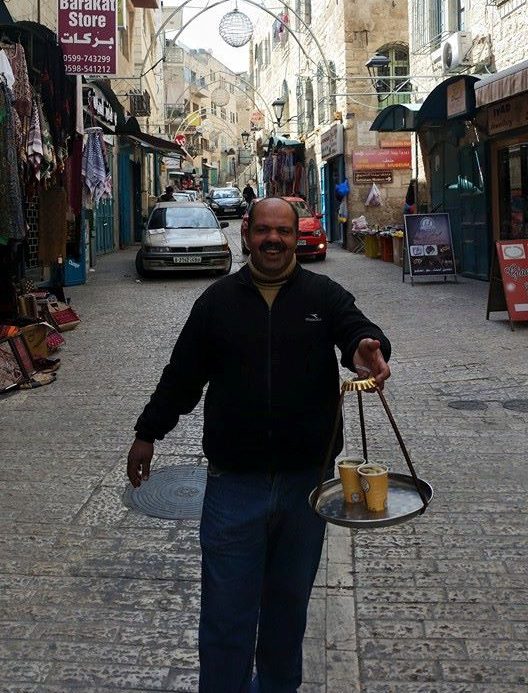
"I know you have been looking for me!"
"Excuse me?"
"I make the best tea in all of Bethlehem! Inside is mint, cinnamon, then, sage, ginger, coriander, lemon, and a little bit of love...."
"How did you start making tea?"
"...My grandfather came to Palestine from Morocco many years ago -- he couldn't go back so, he stayed here and started selling tea...using a family recipe... When I was a boy, my father taught me how to make tea, and I started selling tea in the market when I was thirteen years old."
"Do you like your job?"
"Some people say to me, 'you just sell tea and coffee.' This isn't working - this isn't a job. But I think they are jealous of me."
"How are they jealous?"
"I say to these jealous people, 'this is very good working because I make people happy with my tea.' Most people don't have jobs that make people happy. I do. I have the best job in the world."


"My dream was to become a Priest... I remember that when I was very young, my father took me to church every Sunday in Jerusalem - and I just knew... My family didn't want me to [be a priest], but I became one anyway...."
"Where did you study?"
"I'm a Palestinian. Many ignorant people don't know that there are Palestinian Christians... I was born in Bethlehem, and as a boy, I went to the Fransiscanschool...but [to study for the priesthood] I went to Lebanon to a Greek Orthodox [seminary]... I never imagined that I would be a Priest in this church and that my children and grandchildren would visit me here...."
"What is special about this church?"
"This is the birthplace of Jesus Christ. In this church, I feel the holiness. It draws me here every day, and when I don't come, I feel something wrong, I feel something missing from me...."
"What was Bethlehem like when you were a boy?"
"... Christians and Muslims played together. In the past, it was very quiet, and we lived together. Now circumstances are different. The people have changed...I hope that Da'ash will not come here."
"If you could share one message to the young people of the Holy Land, what would it be?"
"... The most important message of Jesus is of love and forgiveness. When you have a love of yourself, you have peace, and you have everything. If you don't have love, you don't have anything... My advice for the young people is to love each other, to forgive each other, and to live in peace."
— at Church of the Nativity.


"As my father laid dying, he told me that he was a Jewish Catholic and that his father had been a Jewish Catholic too... I didn't know what he was talking about... After he died, I read about Judaism and realized that the strange habits of my village were Jewish...."
"What did you do with this information?"
"I went to the elders of my village. I told them that I suspected that we might have descended from Jews...They sat in silence, and I could tell they were uncomfortable... One by one, [each] elder denied it. But two elders remained silent. I asked the two [to share] their thoughts [and they] admitted that they were Jewish Catholics too."
"How did the others react?"
"The other elders were furious with them... but especially at me. I argued with the elders that if we were Jews, then we had to start doing Jewish things... Some of them were shaking with fear. They all told me that we were Catholic now and demanded that I never speak of the matter again... That it would bring a great mess on myself and [the] village...."
"How could they stop you?"
"In my village, I am a powerful man. The elders told me that if I discussed this with others, they would ruin me... and make sure that the police took care of me... I never mentioned it again...."
"Why do you think the elders were afraid?"
"....The inquisition in Goa was very bad - far worse than it was in many other places...they would torture and then burn them alive...and it only ended recently...The fear [of the inquisition] is burned into our blood... But the Portuguese are gone, and the inquisition is over -- now it remains only in our hearts."
— with Avigail John in Goa, India.


"I didn't excel in academics. Actually, I hated school. For college, I wanted to go to Morepark Exotic Animal Training College. At the time, they accepted only 15 people out of 500 applications from around the world. It was the only program of its kind. During the interview, I sat before fifteen academics, CEOs, and directors of animal parks and zoos. They asked me why I wanted to work with animals. I told them it was the only thing that I ever wanted to do with my life. One of the men on the panel questioned if I didn't get into the program what I would do instead. I told him that I was going to get into the program and that if the program didn't accept me this year, then I would apply again and again and again until they accept me. The panel liked my answer, and it was the only reason why I got accepted. "
"Of all your classmates at Morepark, you have done the most for animals. If you were on the admissions committee today, what would you be looking for in a candidate?"
"I would be looking for someone different than the academics. I'm looking for someone who innately doesn't automatically fall in line with the rules. Not a rebellious person -- but a person who isn't frightened by not following the rules. A person who doesn't have a lot of fear of the expectations of what they are supposed to be - about the expectations of others; of what others want them to be. Such a person can't do this kind of work."
"Why?"
"In this field, you are every day facing failure - trying to do what has never been done. You must be so driven and committed by your desire to better the lives of these animals. It can't be that you are influenced by others, or that you feel you are knowingly giving something else up to do this work. You must have the view that if I'm not doing this work, then I'm the one being deprived."
"What advice would you give to other activists across the world?"
"Aim for sustainability. There was a time in my life where I relished getting three hours a night of sleep. I would make this list at the end of the day of everything I accomplished. If my list was too small, I'd beat myself up. I thought that if I ran myself into the ground, I was a better person. But I've learned that the only way you can truly help others is to make sure to take care of yourself. Have respect for yourself. Take care of your body - eat right and exercise. Take care of your spiritual life. Don't lose yourself. Taking care of yourself is the foundation for giving to others."
— with Carol Buckley in Chitwan National Park.


"I grew up in a very poor family, in a very poor village in Nepal. I literally didn't know where my next meal would come from. Nobody in my family could read and write, but my parents instilled within me a value for education. Today, I speak five languages, I am a college graduate, and I have lived, worked, and traveled in 23 countries. I own my own business."
"You are involved with many charities; why is giving to others so important to you?"
"From traveling, I developed three rules for living: Don't lie, don't slander, and be ambitious in everything you do. In my travels, I also saw many people, some rich, some even poorer than me, and each had their own styles of wasting time. From this, I realized that I want to do something unique and meaningful with my life. I want to give to others. I want to expand people's minds. I want to make a difference and the most of my life. I believe that if you have more than others, if you know something others don't, then you can't keep it to yourself - you have an obligation to share what you have with others."
— with Bal Krishna Amgain at Chitawan Narayanghat.


"Why did you come to Nepal?"
"I am a shliach of the Lubavitcher Rebbe. Like every Lubavitcher kid, my dream in life was to be a shliach. My wife and I came to Nepal to give spiritual and physical sustenance to Jewish travelers. The Chabad House is their home away from home."
"You and your wife adopted a non-Jewish Nepali boy. How did that happen?"
"There are many children living on the streets of Kathmandu. When we first met him, he was dirty and starving. He was injured from being attacked by street gangs. He wore plastic bags as clothing because his real clothes had been stolen. He asked us for food and we gave him. When he came back the next day asking for more food, we told him that if he wants food and shelter, then he must go to school."
"Why did you help him?"
"In the Book of Isaiah, God gave Jews and non-Jews a commandment to 'settle the world from chaos.' We learn from the Sefer HaChinuch that the world is supposed to be a place where people live a peaceful life, where people have their material needs met - with education and with love. Here in Nepal, it is very easy to fulfill this mitzvah. Today, Baruch Hashem, my kid is thriving. We never have to tell him to study. He understands that education is a ticket to a better life."
"There are many children on the streets, some involved with drugs, others were adopted but then returned to the streets. What made you take a chance on him?"
"Hashem gave us ten commandments, but there is an eleventh commandment too. We are forbidden from judging or prejudging any person. We never know what happened in a person's life. We must respect their experiences."
— with Chezki Chani Lifshitz in Kathmandu, Nepal.


"I live in a village called the Upper West Side. My village is filled with singles; there are no married people. The singles mix and meet only with each other. They have many requirements before they marry - and some even to meet. What are the requirements for marriage in your village?"
"The first is that a man must be single. Otherwise, a woman won't want to marry. Some men don't understand this."
"What else?"
"If one has an older brother, then he must be married before you. If one has a sister of marriageable age, then she also must be married before."
"What else?"
"I'm a Brahman. So my wife must also be a Brahman. Within the Brahman caste, there are three ranks of Brahman. So, any girl I marry must be of the same rank Brahman or above. Otherwise, if I marry a girl from a lower Brahman caste, then my children will be of a lower caste too."
"What if someone wanted to marry a girl from a lower caste?"
"They would have to get permission from their parents who would probably say 'no.' But these days, if someone marries a girl from a low caste, like a Dalit, then the government will give them 100,000 rupees."
"Any other requirements?"
"Because I am the oldest son, in my culture, I am obligated to take care of my parents. They will live with me when they are old. So my parents have an opinion on who I marry, and they will want a nice girl who will help take care of them."
"Anything else?"
"Some families also want to make sure that the girl's family does not live too close because then she will always be at her parents and not take care of her husband -- but I don't care about that kind of thing."
"What kind of personality should she have?"
"She should be quiet and respectful to her elders. She shouldn't raise her voice. She should wear a nice sari or kurta. She shouldn't wear western clothing."
"What is the ideal age for women to marry?"
"22 to 28."
"What happens if she's over 28?"
"Then she will have to compromise about the qualities she wants in a man."
"What about loving the person you marry?"
"It depends. If I love a girl, then I will try to marry her. If I don't, then I will ask my parents to find me a wife, and then I will grow to love her."
"What advice would you give to all the singles in the Upper West Side?"
"It sounds like a great village - a village of freedom and fun. But the people there should get married. Then they should move to a married or normal village. I would also tell the people in your village to make their marriage lists shorter. You can't find all the qualities you want in a single person."
— with Rupak Koirala in Kathmandu, Nepal.


"My family has been making shoes for centuries."
"How did your family start making shoes?"
"I am a Dalit. My caste is despised. In my culture, the lowest of jobs is to work with feet and leather."
"What is the life of a Dalit like?"
"Being a Dalit is very hard. Twenty-five years ago, I converted to Christianity. I heard about Jesus Christ, and I knew at once in my heart that his teachings were the truth."
"What was it about his teachings that most spoke to you?"
"In my church, I worship together with people who came from many different castes. The bible doesn't divide people into castes. The bible teaches us that all people were created in the image of God, that all people are the same so as long as they do good deeds."
— at Sanepa.


"You are a founder of Bangladesh, a former governor of both Goa and Punjab, you have led men into battle as a General in the Indian army, and have met and worked with more world leaders than I can name. In your view, what makes a leader?"
"Leaders are not born -- they are made... I never decided I would be a leader... It was thrust upon me... I just happened to be in the right place at the right time... Becoming a leader takes sincerity and dedication... [It requires] fixing your sites on a target and sticking to it and not wavering...The hardest thing about being a governor was resisting outside pressure from others of what they wanted me to do instead of my job [and] of doing what I thought was the right thing...."
"Tell me about your family."
"I'm from Kolkata. My family was Baghdadi... My parents spoke Arabic to each other when they didn't want me to understand what they were saying... My mother called me Farj, which means happiness in Arabic... My mother was a very hard and determined person -- my father a soft and generous man...I was more like my mother..."
"What do you love most about India?"
"Its tolerance... Jews have been in India for thousands of years, and in all that time, there was never any antisemitism... The British were the opposite... Only with the British, in boarding school and later in the British army, did I experience antisemitism... I was in an English school, and they were bastards... I had a lot of problems with British officers... I never had any in the Indian army... The British would call me 'damn Jew,' 'bloody Jew,' and tell me, 'you damn Jew, you crucified our Lord'... I got into many fistfights... As an Indian and as a Jew, the day the British left India was one of the happiest of my life."
— in New Delhi, India.


"I see a lot of harassment of women in Delhi - especially of foreign women. Some relate to them like animals. This is very wrong, and it makes me feel uncomfortable... I try to protect women - even the ones I don't know... I tell these men that all of mankind comes from a woman, how can you disrespect a woman? Do we not all have mothers? I also warn them that life is like a mirror and what you put out is what you will one day receive."
"What do you hope for the women in your life?"
"I have a daughter. She is six years old. She's very smart, and she told me that one day she will be a doctor. I drive a rikasha every day, sometimes for as long as fifteen hours a day. It is very hard work. But I love my job because her dream is my dream."
— in New Delhi, India.


"I am descended from Khwaja Moin-Uddin Hassan Chishty Garib Nawaz Al-Ajmeri, a Sufi saint. Our family has watched over this dargah shrine for the past nine-hundred years. My work at this dargah is my life. I seek only to spread his teachings. "
"What is the favorite teaching of your ancestor?"
"Knowledge is an ocean without a shore. Knowledge does not come from books but through companionship."
"So what does this mean in your life?"
"I try to surround myself with friends of Allah, those who are good souls, and those who have knowledge of him. With a good friend, a person can find knowledge and find God."
— with Sahibzada Syed Alihamza Chishty and Syed Adil Ahmed Chishty at Ajmer Sharif.


"I have watched over this synagogue for over sixty years. Inshallah, my son will continue to watch it when I am gone. He will be the fifth generation of my family do so."
"Why is it important for you to look after the synagogue?"
"It is our Islamic obligation to protect those that worship one God."
"What do you remember about Jewish life here?"
"I remember there were once thousands of Jews here, and they came to synagogue on Sukkot and Shabbat, and they would pray and dance with the Torah. Our prayers were their prayers. But now they are all gone - scattered around the world. I miss my friends. "
— with Sol Noah and Jared Lander in Calcutta, India.

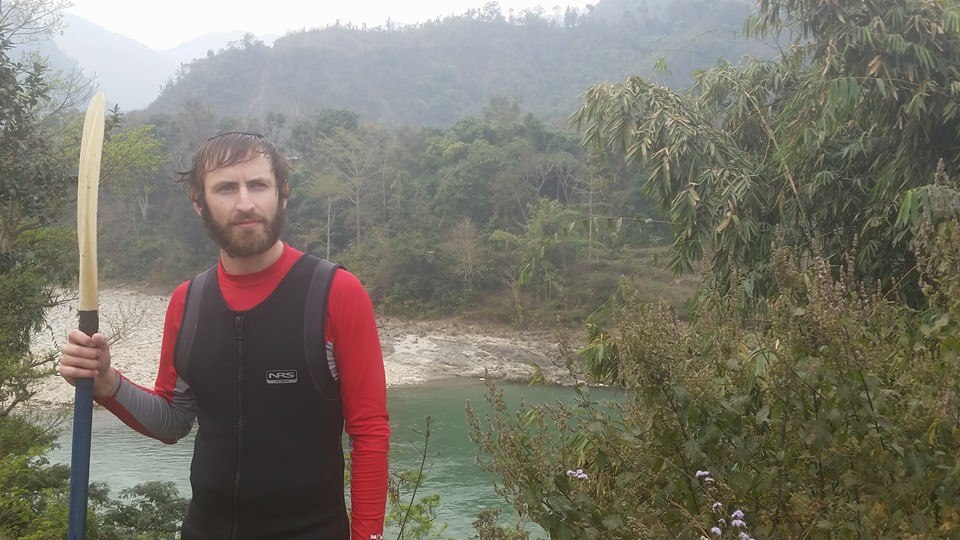
"Life is like kayaking on a river. Like time, the flow of the river carries us forward. All are equal on the river, each of us the master of the fate of our boat. And yet, despite what we might think, we cannot control the current. To navigate upright, we must learn the river's ways. Sometimes the rapids flip our boat over, and we get wet - but the river doesn't stop - it just keeps flowing. We have no choice but to get back in the boat, look forward, and paddle on."
Edited: J.R. Rothstein — with Josh Weinstein andSarah Levine at Trishuli.

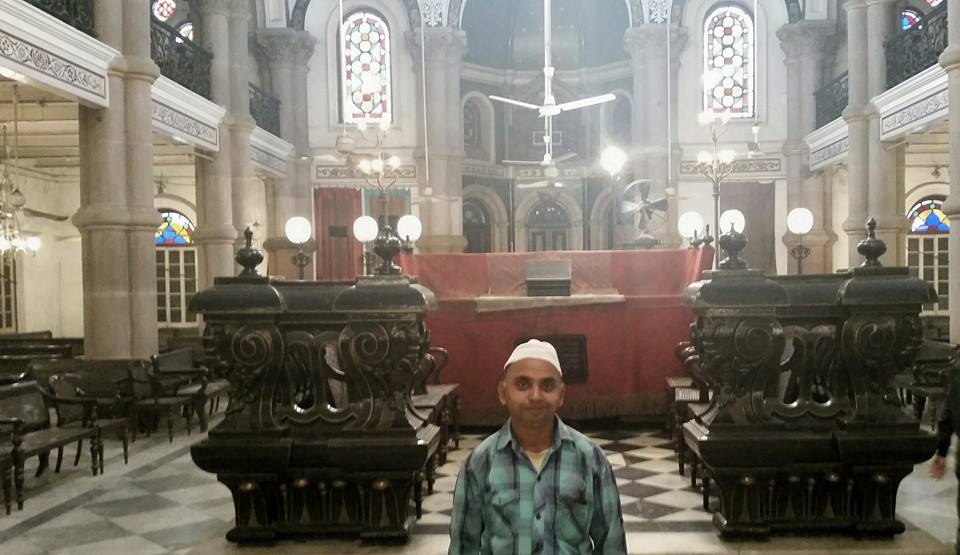
"I am a Muslim, and I am the guardian of the Magen Dauod synagogue of Kolkata. Protecting this place is my life and my Islamic obligation. My family has watched over this synagogue for three generations."
"What do you do for the synagogue? "
"I maintain the synagogue and clean the Torah scrolls. I also make sure that Jews from around the world that visit, feel at home."
"What is the relationship between the Jewish and Muslim communities in Kolkata? "
"The Jews here mostly work with Muslims, not with Hindus. The Muslim-Jewish relationship is very strong. Jewish and Muslim habits are the same. We both pray to one God in a land of many gods. Our mosques are next to their synagogues. We dress the same, and we eat the same. We both speak Arabic, and we both come from the middle east. We are like brothers."
— with Sol Noah, Barry Mizrahi, and Jared Lander.





